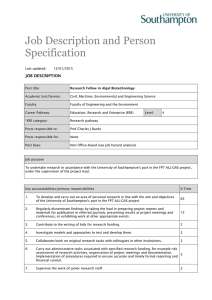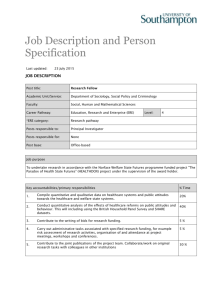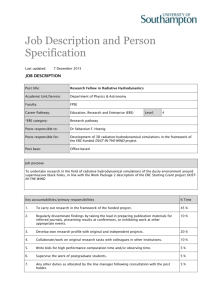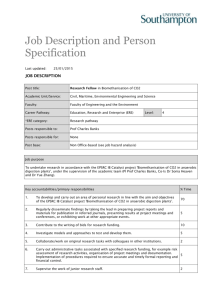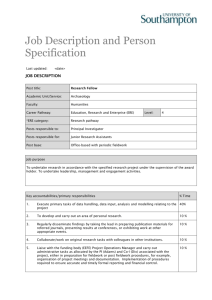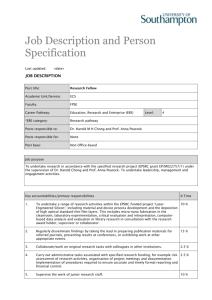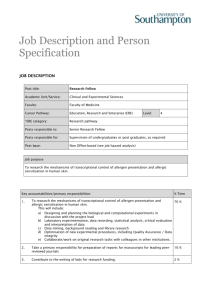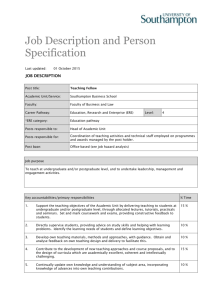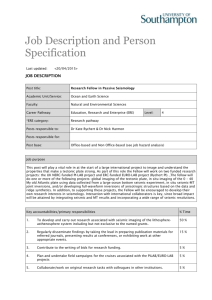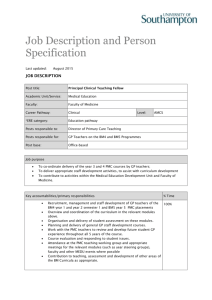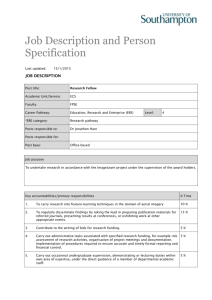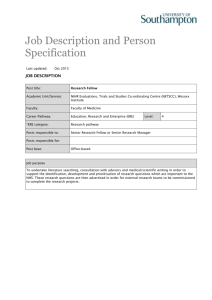Job Description and Person Specification
advertisement
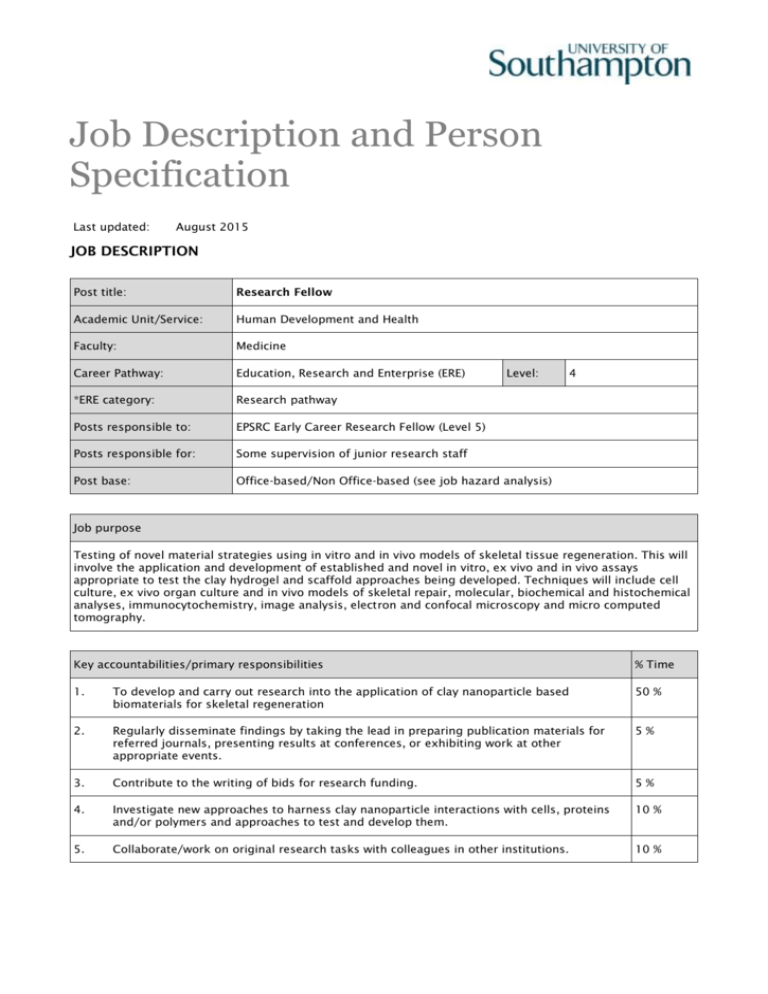
Job Description and Person Specification Last updated: August 2015 JOB DESCRIPTION Post title: Research Fellow Academic Unit/Service: Human Development and Health Faculty: Medicine Career Pathway: Education, Research and Enterprise (ERE) *ERE category: Research pathway Posts responsible to: EPSRC Early Career Research Fellow (Level 5) Posts responsible for: Some supervision of junior research staff Post base: Office-based/Non Office-based (see job hazard analysis) Level: 4 Job purpose Testing of novel material strategies using in vitro and in vivo models of skeletal tissue regeneration. This will involve the application and development of established and novel in vitro, ex vivo and in vivo assays appropriate to test the clay hydrogel and scaffold approaches being developed. Techniques will include cell culture, ex vivo organ culture and in vivo models of skeletal repair, molecular, biochemical and histochemical analyses, immunocytochemistry, image analysis, electron and confocal microscopy and micro computed tomography. Key accountabilities/primary responsibilities % Time 1. To develop and carry out research into the application of clay nanoparticle based biomaterials for skeletal regeneration 50 % 2. Regularly disseminate findings by taking the lead in preparing publication materials for referred journals, presenting results at conferences, or exhibiting work at other appropriate events. 5% 3. Contribute to the writing of bids for research funding. 5% 4. Investigate new approaches to harness clay nanoparticle interactions with cells, proteins and/or polymers and approaches to test and develop them. 10 % 5. Collaborate/work on original research tasks with colleagues in other institutions. 10 % Key accountabilities/primary responsibilities % Time 6. Carry out administrative tasks associated with specified research funding, for example risk 5 % assessment of research activities, organisation of project meetings and documentation. Implementation of procedures required to ensure accurate and timely formal reporting and financial control. 7. Supervise the work of junior research staff. 5% 8. Carry out occasional undergraduate supervision, demonstrating or lecturing duties within own area of expertise, under the direct guidance of a member of departmental academic staff. 5% 9. Any other duties as allocated by the line manager following consultation with the post holder. 5% Internal and external relationships Direct responsibility to holder of research award or academic supervisor. May have additional reporting and liaison responsibilities to external funding bodies or sponsors. May be asked to serve on a relevant Academic Unit committee, for example research committee. Collaborators/colleagues in other work areas and institutions. Special Requirements To attend national and international conferences for the purpose of disseminating research results. Applications for Research Fellow positions will be considered from candidates who are working towards or nearing completion of a relevant PhD qualification. The title of Research Fellow will be applied upon successful completion of the PhD. Prior to the qualification being awarded the title of Senior Research Assistant will be given. Document1ERE Level 4 – Research Pathway – Research Fellow 2 PERSON SPECIFICATION Criteria Essential Qualifications, knowledge and experience PhD or equivalent professional PhD or equivalent professional qualifications and experience in Stem qualifications and experience in the cell biology and/or tissue testing and application of engineering biomaterials Detailed understanding and knowledge of stem cells, cartilage biology and bone biology Significant experience of in vivo models of tissue regeneration Desirable How to be assessed Application, CV and Interview Knowledge of stem cells, cartilage biology and bone biology Experience and knowledge of microscopy, micro computed tomography and image analysis techniques Planning and organising Able to organise own research activities to deadline and quality standards Application and Interview Problem solving and initiative Able to develop understanding of complex problems and apply indepth knowledge to address them Application and Interview Able to develop original techniques/methods Management and teamwork Able to supervise work of junior research staff, delegating effectively Able to contribute to Academic Unit management and administrative processes Application, CV and Interview Work effectively in a team, understanding the strengths and weaknesses of others to help teamwork development Communicating and influencing Communicate new and complex information effectively, both verbally and in writing, engaging the interest and enthusiasm of the target audience Application, CV and Interview Able to present research results at group meetings and conferences Able to write up research results for publication in leading peer-viewed journals Work proactively with colleagues in other work areas/institutions, contributing specialist knowledge to achieve outcomes Other skills and behaviours Understanding of relevant Health & Safety issues Positive attitude to colleagues and students Document1ERE Level 4 – Research Pathway – Research Fellow 3 Special requirements Able to attend national and international conferences to present research results Document1ERE Level 4 – Research Pathway – Research Fellow Interview 4 JOB HAZARD ANALYSIS Is this an office-based post? ☐ Yes If this post is an office-based job with routine office hazards (eg: use of VDU), no further information needs to be supplied. Do not complete the section below. ☐ x No If this post is not office-based or has some hazards other than routine office (eg: more than use of VDU) please complete the analysis below. Hiring managers are asked to complete this section as accurately as possible to ensure the safety of the post-holder. ## - HR will send a full PEHQ to all applicants for this position. Please note, if full health clearance is required for a role, this will apply to all individuals, including existing members of staff. ENVIRONMENTAL EXPOSURES Occasionally Frequently Constantly (<30% of time) (30-60% of time) (> 60% of time) Outside work NA Extremes of temperature (eg: fridge/ furnace) NA ## Potential for exposure to body fluids YES ## Noise (greater than 80 dba - 8 hrs twa) NA ## Exposure to hazardous substances (eg: solvents, liquids, dust, fumes, biohazards). Specify below: YES Frequent hand washing Ionising radiation YES NA EQUIPMENT/TOOLS/MACHINES USED ## Food handling NA ## Driving university vehicles(eg: car/van/LGV/PCV) NA ## Use of latex gloves (prohibited unless specific clinical necessity) ## Vibrating tools (eg: strimmers, hammer drill, lawnmowers) YES NA PHYSICAL ABILITIES Load manual handling NA Repetitive crouching/kneeling/stooping NA Repetitive pulling/pushing NA Repetitive lifting NA Standing for prolonged periods YES Repetitive climbing (ie: steps, stools, ladders, stairs) NA Fine motor grips (eg: pipetting) YES Gross motor grips YES Repetitive reaching below shoulder height NA Repetitive reaching at shoulder height NA Repetitive reaching above shoulder height NA PSYCHOSOCIAL ISSUES Face to face contact with public YES Lone working YES ## Shift work/night work/on call duties NA Document1ERE Level 4 – Research Pathway – Research Fellow 5
